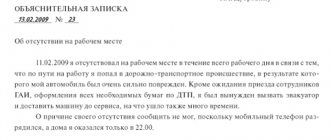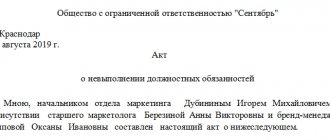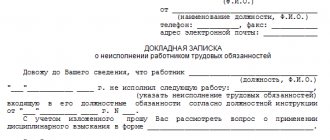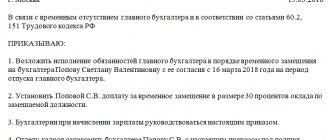Any incident at work must be considered as part of an internal investigation and disciplinary punishment must be imposed on the offender. Gross violations of labor discipline, for example, absenteeism or drunkenness, must be stopped in a timely manner. In any situation, the employee is asked to explain the reasons for the incident in the form of a note.
This document contains important information from the employee himself about his vision of the situation. Since disciplinary action entails a complex legal process, it is worth considering the procedure for filling out the document using the example of a sample explanatory note about failure to fulfill job duties.
Why is it compiled?
An explanatory note is a written form of explanation of the reasons why an employee failed to complete a task, violated some rule, or completely ignored his professional responsibility. The Labor Code also requires workers to provide all types of explanations for misconduct only on paper.
There are a number of reasons for this:
- There is no way to correctly understand spoken language, since sometimes words can explain things ambiguously or convey contradictory meanings to them.
- The recorded information will not be lost and will be a document for further investigation of the incident.
- There is no possibility to change the data and make adjustments to it, which can also affect the course of the official investigation.
- Lack of emotional coloring and bias towards a person during a personal conversation.
- Objective recording of data without personal intervention.
- Long-term storage.
The explanatory note should not be considered a verdict. Its presence is aimed at a loyal and objective consideration of the incident. It specifies all the reasons and circumstances that contributed to the current situation.
Is it possible not to write a note and what are the consequences?
As already mentioned, this action is not mandatory. The employee himself is primarily interested in writing it in order to resolve the situation positively. Articles 193 and 246 of the Labor Code suggest that refusal to provide an explanatory note be recorded using a special act. But the chances of avoiding punishment are, naturally, significantly reduced. There are no other specific consequences for refusing to write.
By depriving yourself of the opportunity to express a personal opinion and provide your vision of the situation, most often you will not achieve a mitigation of the disciplinary sanction (for example, the revocation of a reprimand for failure to fulfill official duties). After all, to any leader such a refusal will seem like a reluctance to admit one’s own guilt or mistake, especially in cases where it is obvious.
How to write an explanatory note
An explanatory note is a legally significant document. It is drawn up as an official letter addressed to the director or other responsible person. It is written on a blank sheet of paper or a special form of the organization. Whether it is handwritten or printed is not significant; the main thing is the presence of a “live” signature of the employee himself, as well as the date of compilation.
The law defines the requirements for the deadline for submitting a note and its content. The employee must, within two working days, upon request from the manager, give a written explanation of the incident. If the employee did not write a note, a report is drawn up, which in the future may influence the decision on disciplinary action.
Procedure for compilation
There is no approved standard form of an explanatory note. Considering the essence and purpose of the compilation, attention should be paid to confirming the chronology of the facts, one’s own interpretation of what happened and agreement or disagreement with the conclusions set out in the primary document. The standard filling template includes the following details:
- Explanatory header - information about the addressee in the dative case and the addressee in the genitive.
- The main text is in an official business style without rhetorical digressions and emotions, arranged in the order:
- narrative part – chronology of events and the essence of the incident;
- an explanation of the reasons that led to the situation;
- an admission of guilt with a promise to improve or a reasoned justification of innocence.
- Attachments of documents confirming innocence or reducing the degree of guilt.
- Date of compilation and signature of the author.
It is advisable to draw up the document in two copies, one to be provided to management, the second with a note from the responsible person (secretary, HR inspector, clerk) about receipt and date, to be kept as confirmation of timely provided information about the misconduct and reasons.
Download the Explanatory Note (difficult transport situation) (28.5 KiB, 478 hits)
Example of an explanatory note for being late to the workplace (26.5 KiB, 655 hits)
Sample explanatory note for failure to fulfill official duties (24.0 KiB, 563 hits)
What to write if the plan is not fulfilled (example) (24.5 KiB, 256 hits)
About failure to fulfill the plan
Failure to fulfill the plan is the most typical official violation. This could be a sales plan for a certain period, or a work plan for a project. Such violations can lead to disruptions in the work process, decreased company profits, and reputational risks.
To prevent negative consequences, including as an educational measure, you can require an explanatory statement from the staff about the failure to fulfill the set plan.
When requesting this document, you should be well prepared. To do this, you need to have written evidence of what plan was delivered and within what time frame. How it was communicated to the employees (preferably in writing with a signature). What results were achieved in a specific time.
In the note, employees must also indicate the reasons for the failure to fulfill the plan (objective and personal), what was done to improve the situation, and their vision for correcting the shortcoming. By comparing the data, a decision should be made on whether to apply disciplinary punishment or not.
Types of disciplinary liability
Labor legislation stipulates that an employee may be reprimanded for failure to fulfill functional duties. If the employee has previously had reprimands, he may be fired for ignoring his job duties.
Important! Clause 5, Part 1, Article 81 of the Labor Code clearly states that dismissal for failure to perform work is permissible only if such a violation has already been committed at least once. If an employee does not cope with his work for the first time, it is prohibited to fire him.
Please also note that you cannot simultaneously reprimand the employee for one violation and subsequently dismiss the employee. Only if the employee is again subject to disciplinary action can he be dismissed, otherwise he can easily be reinstated to his position through the court.
Error in operation
No one is immune from mistakes in their work, not even the best specialist. Conventionally, we can name two reasons for the appearance of errors in work:
- Personal circumstances of the employee (fatigue, poor health, family problems, etc.).
- Failure to comply with job descriptions and labor safety requirements.
Any reason that led to the error must be studied and eliminated. This is especially important if there is an accident or risk to others. To do this, an explanatory note is taken from the person, in which he must set out in detail what caused the error. It is worth indicating all the reasons: personal circumstances, if there were health problems and objective factors.
Even when making a mistake, it is important to show yourself as a professional, objectively weigh all the circumstances, and not shift the blame to others. You should not plead ignorance of the job description and established procedures. This only further encourages the employee to admit guilt. It is important to be able to admit your mistakes and take measures to prevent them.
What reasons should be indicated in explanatory notes?
Do you want to correctly compose an explanatory note? Then consider how employers feel about the reasons for being late or absent:
- A story about traffic jams rarely impresses management (the exception is the situation when the traffic jam was caused by an accident).
- A child’s illness or problems in kindergarten are considered valid reasons, as long as you do not abuse them. A working mother of a child under 1.5 years old has the right to periodically be absent from the workplace. According to the Labor Code of the Russian Federation, she is required to provide additional breaks for feeding. Important condition: the time away from the place should not exceed 30 minutes. Also, a working mother is required to write a statement in advance. Parents of a disabled minor also have benefits: they can count on 4 additional days off every month.
- Poor health must be confirmed by medical certificates or by calling an ambulance.
- Absence from work related to participation in a court hearing is also considered a valid reason. But in such cases, you must have a subpoena in hand.
- A utility accident at the employee’s place of residence will be a sufficient reason for absence.
Those that the law defines as force majeure circumstances are also considered valid reasons. These include natural disasters, road accidents, military actions, etc. If you do not show up for work due to factors beyond your control, and the issue comes down to dismissal, the law gives you 30 days to challenge the decision in court.
You can clarify the nuances of submitting an explanatory note about failure to fulfill official duties using the video:
A respectful reason
Sometimes an offense is committed for a good reason. This is quite difficult to prove and requires a more thorough study of the incident. To do this, a person must fully describe the situation, what he did, why such a decision was made and not another. You can indicate all the options for the development of events, as well as their consequences in the current situation. This way you can try to justify your actions in committing an offense. Sometimes you really have to choose the lesser of two evils.
Example of an explanatory note in case of shortage or surplus of goods
If a shortage of goods or funds is detected at the store's cash register or warehouse, an explanatory note is written by the responsible person. The relevant information is entered into the accounting department of the enterprise, and the submitted document is attached to the reporting. The text must indicate that you are the responsible person and undertake to compensate for the shortfall from your salary.
It happens that the entire shift is blamed for a shortage of goods (for example, in a supermarket). In this case, indicate that you have nothing to do with the shortage and that you performed your duties in full.
If surplus or mis-grading is detected, the responsible person must submit an explanatory document. The surplus comes in according to accounting rules.
Sample explanatory note about non-fulfillment of labor duties
The law does not establish forms of explanatory notes. Below are samples of them.
It is clear from the texts that both notes are written schematically. They contain concise information about the incident, its consequences and causes. And also an admission of guilt.
This format is most convenient to read to understand the vision of the situation and the employee’s involvement in it. All this will help to pronounce the right punishment for the offender.
Key Aspects
Any employee can make mistakes when performing their duties. And this does not always depend on what professional level the citizen has and what experience he has in this industry.
Mistakes are made due to fatigue, poor health, etc. Such mistakes are classified as failure to fulfill official obligations.
And in this case, you have to write explanatory notes. Find out what kind of document it is, when and how to write it, what the deadlines are for requesting and drawing up the document, etc.
What it is
An explanatory note is a document that can be drawn up during the interaction between an employee and an employer.
This document reflects explanations of the content of some provisions of the main documents (plans, reports, projects, etc.). With its help, they also provide explanations of the reasons for any event, facts, or actions.
Purpose of the document
The management of the departments of the organization where the guilty person works has the right to write a memorandum [/anchor] addressed to the head. Such a note can also be submitted by the employee himself.
If an employee fails to fulfill his duties, there is a risk of being subject to disciplinary action - reprimands or reprimands.
If an accident occurs due to a mistake, the person may be fired. In each of these cases, employers or department management must demand explanations from the offenders.
Explanations may be oral or written. Legislative documents do not stipulate exactly what an explanatory note should look like.
But it must contain information about why the error was made. All prerequisites and other information that relates to the situation are written down.
The correctness of the note will determine what punishment is given to the employee.
Please note that a citizen can be subject to disciplinary sanctions only if, when he was hired, the person was familiarized with job descriptions.
And the instructions are provided to the employee for review even before the employment agreement is signed.
Legal basis
All legal norms are prescribed in the Labor Code of the Russian Federation. This document states that an explanatory note may be requested only in certain cases. Art. 193, 247 TK.
What not to refer to
When drawing up an explanatory note, you should be correct. Of course, the causes of the incident may be various circumstances and specific people involved. But if you have the honor of writing an explanation of the situation to a specific specialist, you should remember that not everything can be said.
First of all, you should avoid overly emotionally charged speech, obscene and abusive language. You should not blame your colleagues or boss for incompetence or negligence, and present yourself as a victim or present false facts.
It will also not be the most successful if you write that you did not know how to do something, forgot or were not familiar with it. This will not justify the person, but will lead to more complaints.
It would be correct to present the situation in the order in which it all happened. There is no need to hide any information or lie. You shouldn’t act like a child and try to shift the blame onto someone or circumstances, compare yourself with colleagues, and the like. It is better to honestly admit your shortcomings and flaws in your work. As you know, admitting guilt mitigates the punishment.
An example of an explanatory letter for failure to complete work
If you did not fulfill part of your job duties, do not indicate that you forgot the instructions or were not familiar with them in full . Also, do not write false facts that are easy to verify. If there is no way to justify yourself, admit the mistake, but do not try to blame other employees or management.
Who can demand an explanatory note
According to the law, the employer can request an explanation. The thought immediately comes to mind that this should be the director of the organization. By and large, this is true. Most often, it is the head of the company who makes decisions on disciplinary action against employees, conducting internal investigations and measures to suppress incidents.
However, in modern large organizations, the manager cannot always fulfill this. We are talking about companies with an extensive network of divisions, numerous branches and separate divisions. There are two ways to solve this problem:
Empowering responsible persons with the authority to enter into labor relations and subjecting employees to disciplinary action if necessary. Most often, such persons include branch managers and HR specialists. To confer powers, a corresponding order is issued, and sometimes a power of attorney is issued.
In the event of a temporary absence of the boss, it is important to take care of who will perform his functions on personnel matters. To do this, an order is issued for a certain period on the temporary performance of duties with their full description.
Thus, even with an obvious violation of labor discipline, not every employee of the organization, including those with a leadership position, can demand an explanation from the person responsible for the incident. To avoid such embarrassment and take timely measures to solve the problem, it is worth appointing in advance responsible persons vested with these rights.
How to punish an employee for mistakes
If there are complaints, the employer must have a report confirming the fact of the violation. After recording, the employer must require an explanatory note from the employee. Based on its content, he can decide on a preventive measure.
If the employee’s innocence has been proven, then no punishments are applied to him, but if guilt has been confirmed, then the employer himself must choose the appropriate preventive measure, as well as issue an appropriate order and notify the employee.
Thus, this document allows the employee to justify himself in the eyes of management. Drawing up a memo is not a prerequisite, but you should not refuse the opportunity to avoid punishment.
Planning Tips
They are as follows:
- It is important to be clear about what you want.
- It is necessary to predict and accept not only positive, but also negative results.
- It always costs a little more to plan than you can accomplish. A plan completed by 80 percent is an ideal result.
- Large tasks should be divided into small parts.
- Make plans for life, not just work plans.
- Taking time to be quiet and collect your thoughts will help you analyze the situation and keep it under control.
- Allow adequate time for rest.
- Don't be discouraged if the plan is not fully implemented. You just have to draw conclusions and change either your plan or your productivity.
- Plans should be made for both the long term and the short term. They are very interconnected, and by fulfilling the plan for tomorrow, you are approaching your main global goals in small steps.
- In the age of technology, there are many applications that will help you choose a convenient way to plan, and you will spend a minimum of time on it, getting maximum benefit.
- When controlling your subordinates, insist that they fill out in detail explanatory notes about non-fulfillment of the plan in order to have data for analyzing recurring situations.









